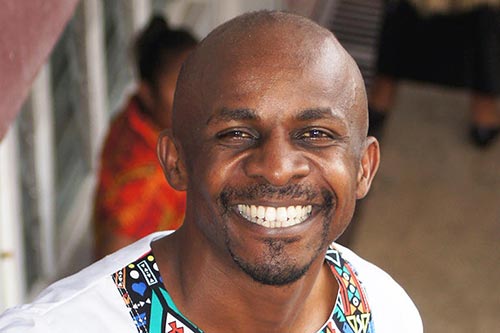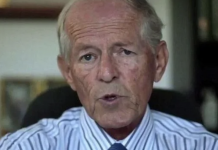Bishop Steve Maina has called on Anglican evangelists to remember that while the Good News of Jesus Christ remains unchanged, Christians must learn how to share the truths of faith in uncertain times.
Bishop Steve told the 70 people attending the AFFIRM conference at St Christopher’s Church in Christchurch last week that they need to expect to meet widely different worldviews and find seekers with very different questions to their own.
To find what people are seeking, Bishop Steve said Christians need to exegete the cultures they might meet in Aotearoa New Zealand as well as exegete the Bible anew to find what the gospel offers into those worldviews.
But first, he said, Christians need to heal their cultural blind spots – by listening well to others’ experience.
Talking with a large group of young people at a church camp recently, he discovered how many of them struggled with anxiety.
“We live in an anxious age..an age flooded with anxiety.” He said, “So finding that we need to ask, how do we speak Christ’s healing peace into that anxiety?”
Bishop Steve said Christians need to look at how worldviews shape how people view themselves and their actions.
He introduced three main worldviews that shape how postmodern listeners might hear the Word.
Worldviews
Guilt – innocence: in this worldview, culture is controlled by individual conscience, and individuals aim to maintain innocence and avoid guilt.
Shame – honour: in this worldview, culture is controlled by community expectations and individuals aim to gain honour and avoid shame.
Fear – power: in this worldview, culture is controlled by spirits, and individuals aim to gain power in the face of fear.
Bishop Steve proposed that New Zealand was once a guilt-innocence culture where individuals made their decisions based on right or wrong, via an external code or set of rules. But now he says that scale is changing.
Bishop Steve cited evangelical scholar David Williams who identifies the predominant worldview of Western culture, which influences New Zealand culture, as a “pain-pleasure” worldview.
“In a pain-pleasure worldview, you look at the world and make decisions based on what feels good to you and what makes you happy.”
“Your identity then becomes as a pleasure-seeker and a pain-avoider.”
In the pain-pleasure worldview, meaning, purpose and significance are all in the here and now, leaving individuals free from concern or responsibility for others.
Being authentic then, shifts to being whatever the individual wants to be, and “my freedom and my happiness” become the greatest values.
Bishop Steve told AFFIRM that the real irony with this worldview, is that nobody really lives in that world.
“We live in an age of anxiety. We are not free to be what we want to be. What does it mean to be free to live for yourself and your own pleasure, when you have so many choices and no way of knowing what will bring you joy?”
Bishop Steve identified three main avenues for connection where the Gospel’s everlasting truths continue to speak into this worldview.
Knowing you are beloved
As Christians, our identity and significance is as beloved children of God. This is not a fragile identity, but an eternal identity. With this self understanding there is no need to be anxious. Who we are is not based on circumstances, and it doesn’t fall apart when our performance fades. Neither does it depend on what others think of us – on social media or off.
“As Tim Keller said, Christianity is the only identity that is received, not achieved.”
True Freedom
As Christians we know that being “free to do what I like” might not leave us as free as we imagine it does.
Without the freedom of life in Christ, most people live longing for something. That longing may be for money, power, status or honour, or to be desired or envied.
“That thing we long for can become an idol, or the thing that enslaves.” said Bishop Steve.
“But Jesus offers us the freedom that money cannot buy – forgiveness, peace, love, joy.”
Real Hope
Bishop Steve suggests too that the comforts of Western culture have insulated many people from the daily realities of pain, suffering and death.
“Life is hard, tragic and death is inevitable.”
“But Jesus offers a way to face the future despite pain, he gives a sense of peace and meaning in life that suffering can’t take away, and sometimes can even deepen.”
Bishop Steve told AFFIRM that the secular worldview is the least well equipped to deal with suffering and pain.
“If pain is the greatest evil, and pleasure is the greatest value, then suffering can never have any meaning.”
Steve Maina thinks that’s a fairly dim picture of what pivots our nation’s moral compass.
But there’s also good news for evangelists.
In the Wilberforce Foundation’s Faith and Belief in New Zealand Report, 35% of New Zealanders are open to changing their worldview on religion if they encounter compelling evidence.
That same survey found one quarter of Christians came to faith when a Christian offered them genuine love and hope in a time of need.
In her doctoral study in 2017, Dr Lynne Taylor – a researcher based in Dunedin – found that previously unchurched Australians decided to follow Jesus after they were invited by a person whose authenticity moved them.
Lynne found that some people became interested in Christianity because of experiencing some sort of catalyst that encouraged them to explore Christianity, such as:
– yearning or wanting more out of life
– curiosity about faith
– having a desire to live better or become who they really were
– a sense that the Christian faith relates to everyday life
– a sense of welcome, warmth, belonging or home-coming
But most participants described at least one person who invited them to know more, and had connected with them in a relational, positive or personally relevant way.
Bishop Steve said that means that by being who we are as Christians, we are missionaries already – either for good or for ill.
“if we understand we have influence among those we know, and we have the good news of Jesus to share, it becomes a question of starting a conversation.”
Bishop Steve offered five ways Christians can prepare themselves for sharing the good news:
– Seek God’s space, look for where God is at work already.
– Find where God’s story intersects with your story and with other people’s stories.
– Pray and be with Christ more closely, so that you have a living relationship to invite others into
– Allow Jesus to change your life – the story of a changed life is compelling and contagious
– Ask questions and listen to the answers. Jesus asked over 300 questions in the Bible.
Bishop Steve concluded with five questions he challenged Anglicans to ask others to find out more about their world view and their approach to faith.
1. Do you think much about spiritual things?
2. Has your recent experience affected the way you look at God?
3. We’ve been friends for quite some time now, and I’ve never really talked to you about the most important thing in my life.
4. Do you find that faith and spiritual values play a role in your (work) (day) (marriage) (perspective on life)?
5. Can I share the thing I’ve found most important to me as a (dad), (mum), (boss)?



